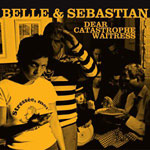
The sound of Belle and Sebastian has always been defined by its personnel. The standard rock quartet, plus full time trumpet player, violinist, pianist, and former cellist (ex-member Isobel Campbell) began the group in 1995 by packing into the practice room, hooking up the mics, and spontaneously wrapping their mastery of ‘60s pop and folk-rock vocabulary around the songs. Everything was so fleshed-out and orchestrated not necessarily through the pretentiousness of studio intention, but by default of who was in the room. But much has changed since then, with actually a development that began with the groups’ last LP, the ‘concept’ driven Fold Your Hands Child, You Walk Like A Peasant (2000)—an album somewhat marred with listlessness (“I Fought In A War”), and poor song concepts (i.e. the Nancy and Lee tribute “Beyond The Sunrise”). While definitely a continuation of this studio-band phase, Dear Catastrophe Waitress returns the missing energy and shifts the focus of the group back where it needs to be—firmly on singer/guitarist Stuart Murdoch’s zealous, sixties-obsessed songwriting talent (rather than on the lesser contributions of other band members).
Murdoch’s ten or eleven wonderful, varied and curious break-up songs make up his heartiest batch since 1996’s remarkable If You’re Feeling Sinister. While failing to achieve the impossible feat of re-surprising you with the old precocious B&S sound, his songs muscle their way to greatness, which is almost as good. Zealous, you say? Listening to Dear Catastrophe Waitress is somewhat like walking through Madame Tussaud’s wax museum of hip ‘60s music—whether it’s the widely adored Left Banke being referenced in “Piazza, New York Catcher” or the not-quite-cool-yet Thin Lizzy in “I’m A Cuckoo.” That B&S even engages in such tributes does suggest to an extent that the original ideas are long gone. But despite a blunt lack of originality, the execution of their thievery is triple that of their previous effort, and at times, astonishing. Where “The Wrong Girl” from Fold Your Hands was Motown done just okay, “You Don’t Send Me” amazes. Likewise, where “The Chalet Lines” was a good pass at Velvet Underground balladry, “Lord Anthony” is absolute Doug Yule worship.
Some songs contain seemingly impossible stylistic pastiches, like the stunning opener “Step Into My Office Baby,” a collection of work-related double entendres about being dumped by someone you’re still sleeping with. In the opening bars, a familiar rhythm & blues affair is met by Celtic-sounding battle drums and flutes. A lovely a cappella middle section shows Murdoch, guitarist Stevie Jackson, and violinist Sarah Martin putting way more effort into being a vocal-group than ever before. Suddenly, the song slows down and the locomotive rhythm scheme begins to reveal itself as a massive nod to what else, but “Wouldn’t It Be Nice?” from the Beach Boys’ Pet Sounds. But why not aim big? The warped folk-rock of “Dear Catastrophe Waitress” conjures-up something Carl Stalling of Merrie-Melodies cartoons might have imagined, with bone-tingling vibes and alternately thrushing or plucked violins. If anything, it continues the Arthur Lee and Love fetishism of the great 2001 “Waking Up To Us” single. Remember B&S performing that song on Conan O’Brian? Dressed in black from head to toe, Murdoch looked somewhat like the bad-ass Luke Skywalker returning to Jabba the Hut’s lair in “Return of the Jedi.” And he does seem bolder, urging the embattled waitress: “Stick to what you know/ You’ll blow them all to the wall/ When they realize what you’ve been working for.” If it’s biographical at all, Murdoch may be revealing that he was never really the ‘boy on the bus’ of the Belle & Sebastian of old—but rather, ‘the guy in the band’ who was plotting his rock-stardom all along.
The high-point of the album is the closer, “Stay Loose,” an epic track which finally follows through on the Roxy Music reference of If You’re Feeling Sinister’s “Me And The Major,” or something like that. More precisely, “Stay Loose” is an indulgence of everything Belle and Sebastian seem to love about ‘70s music. The fuzzy slap-bass of Bowie/Fripp’s “Ashes to Ashes.” The rare chords and dub elements of Elvis Costello’s This Years Model. The twin electric guitar attack of Television (mustered with complete aplomb by Stevie Jackson). Even Murdoch’s vocal is filtered through a vocorder, adding an extra dimension of foreignness to the most unfamiliar of all B&S songs. Murdoch dishes the dirt on a couple living in painfully separate universes, where perhaps “Staying Loose” is the codeword for keeping the failing relationship undefined. “I’m not sure about her motives,” he sings, “I’m not sure about her past.” In addition to being musically distinct, “Stay Loose” is certainly the most venomous thing B&S have engaged in. When someone as generally merry as Stuart Murdoch sings “Happiness is not my goal,” it’s difficult not to pay attention.
The major question to ask is that if Belle & Sebastian have become the epitome of derivativeness, even if their work is executed to such precision, how can they be continue to be important? Most bands, even some of your favorite bands, borrow with sluggishness, and feign originality. Belle & Sebastian steal but manage to make something new of it. Has it become so difficult in 2004 to make a brilliant album?
© 2004 Jonathan Donaldson